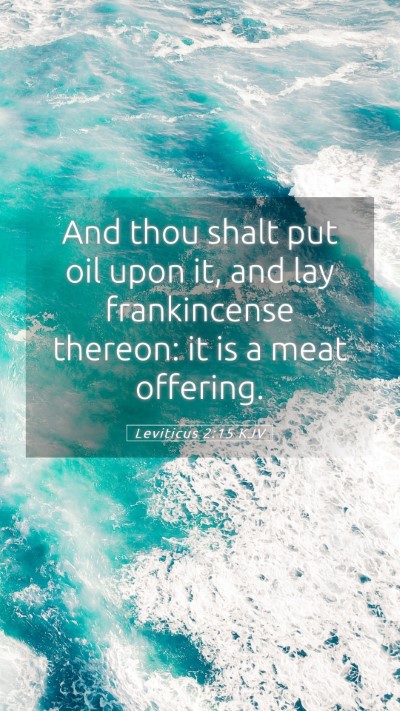Bible Verse Commentary: Leviticus 2:15
Verse: "And you shall put oil on it, and lay frankincense on it. It is a grain offering." (Leviticus 2:15)
Understanding the Verse
The significance of Leviticus 2:15 within the context of the grain offering illustrates the essentials of worship that involve gratitude and devotion. This verse encompasses the ingredients necessary for the offering, which symbolizes the worshiper's acknowledgment of God's provision.
Commentary Insights
This portion of Leviticus details the specific rituals involving the grain offering. Commentators like Matthew Henry emphasize that the inclusion of oil and frankincense signifies the sanctity and sweetness of the offerings made to God, portraying them as pleasing to the Lord.
Albert Barnes elaborates that oil represents the Holy Spirit, and thus the necessity of divine presence in offerings is critical for their acceptance. The frankincense is a symbol of prayer and the spiritual fragrance of devotion. This implies that worship is not about material offerings alone but must be accompanied by spiritual sincerity and purity.
According to Adam Clarke, the grain offerings were meant to express thanks and acknowledgment of God's blessings. He notes the importance of preparing the offering correctly as a reflection of a believer's heart attitude towards God.
Key Themes of the Verse
- Devotion and Acknowledgment: The grain offering reflects a heart of gratitude towards God's provision.
- The Role of the Holy Spirit: The oil symbolizes the necessary presence of the Holy Spirit in acts of worship.
- Prayer and Incense: The frankincense serves as a metaphor for the prayers of the faithful, rising to God as an aroma of holiness.
Application to Daily Life
In modern application, Leviticus 2:15 calls us to examine our own worship practices. Just as the offerings required specific ingredients, our worship should be sincere, marked by the guidance of the Holy Spirit, and genuine devotion. As believers, we are encouraged to offer our lives—our actions, prayers, and offerings—as pleasing to God.
Furthermore, this verse invites reflection on how we present ourselves and our resources before God. Are we offering Him the best of what we have or merely what is left over?
Bible Study Insights
As you explore the meaning of this Bible verse, consider engaging with Bible study groups or utilizing online Bible study tools. These resources can enhance your understanding of Scripture, particularly regarding complex ritual laws like those found in Leviticus.
In-depth Bible study courses can also provide additional context and analysis, helping to unravel the historical significance of grain offerings and their importance in the broader narrative of the Bible.
Cross References
- Exodus 30:34-36 - Instructions regarding incense.
- Leviticus 2:1 - The grain offering as a whole is detailed.
- Matthew 5:23-24 - The call to proper worship and reconciliation with God.
Conclusion
Leviticus 2:15 emphasizes that our offerings—whether tangible or immaterial—should be heartfelt and meaningful. Understanding the elements of the grain offering allows believers to reflect on their relationship with God and the nature of true worship. By diving into scripture analysis and seeking out robust Bible study insights, we prepare ourselves to understand the deeper meanings of Bible verses like this, enriching our spiritual lives and enhancing our relationships with God.


